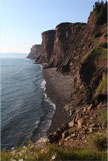Research
The Cliffs of Fundy region has been a centre of research since the 1830’s, when Abraham Gesner was the local physician and the minerals and fossils of the Bay of Fundy attracted
Charles Lyell and others.
The discovery in 1984 of the early Jurassic crocodile, mammal-like reptile and dinosaur fossils at Wasson Bluff became further inspiration for local researchers.
The region now attracts a variety of both local and international research projects including those directed at rift-basin development, paleontology, and resource development. Currently, researchers from Harvard University, the Smithsonian Institute, Columbia University, and others from the UK have done recent work in the area.
Historical and Genealogical Research
The Age of Sail Museum, Ottawa House Museum, Cliffs of Fundy Geopark Welcome Centre, and Bass River Heritage Museum offer facilities and archives to support research related to local history, genealogy, and the ship-building history of the Parrsboro shore.
Bay of Fundy Tides and Ecology
The FORCE visitor centre, 10km west of Parrsboro, overlooks the ocean test site where new tidal energy devices hope to generate electricity from the fast moving waters of the Minas Passage. FORCE provides underwater power cables to connect devices to the shore, and conducts environmental monitoring and research to better understand any potential effects. This renewable technology has the potential to play an important role in Canada’s response to climate change.



 A Geopark is a designation that attracts tourists wishing to explore the connections between geology, local communities, culture, and nature. Geoparks are designed to promote tourism and celebrate a region’s uniqueness, and do not prohibit any land use.
A Geopark is a designation that attracts tourists wishing to explore the connections between geology, local communities, culture, and nature. Geoparks are designed to promote tourism and celebrate a region’s uniqueness, and do not prohibit any land use.